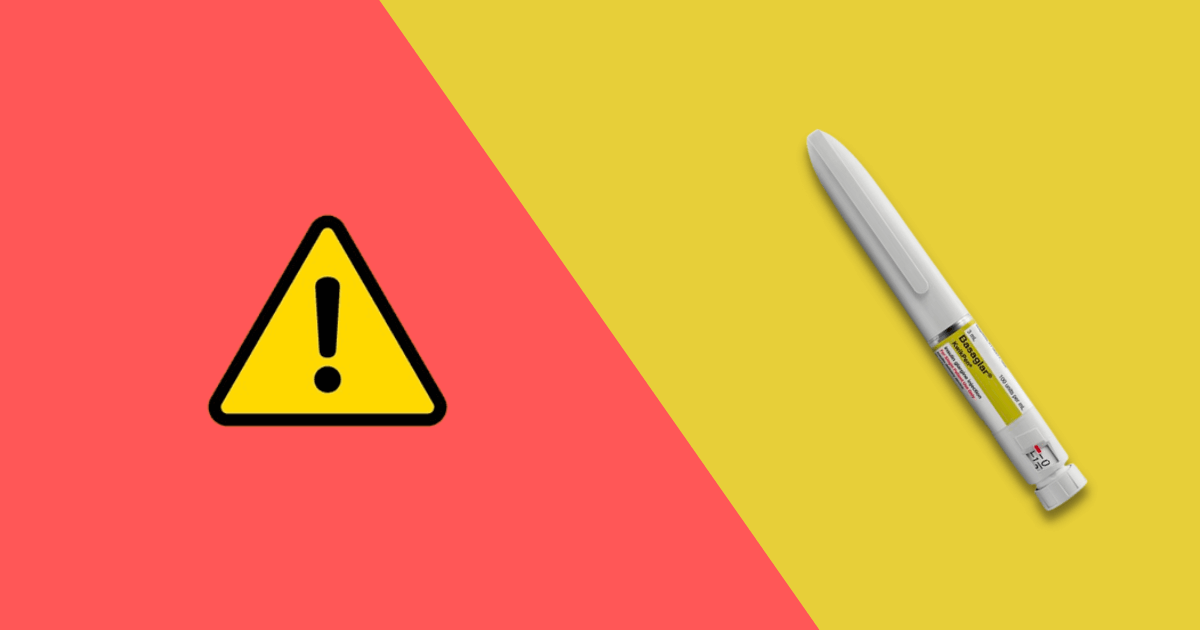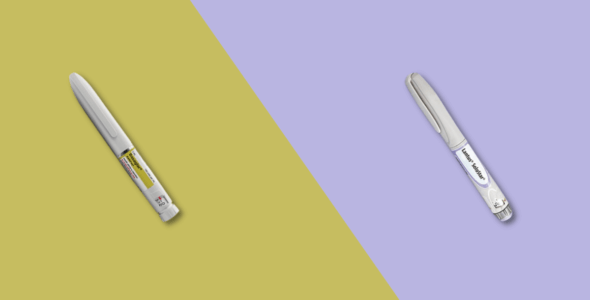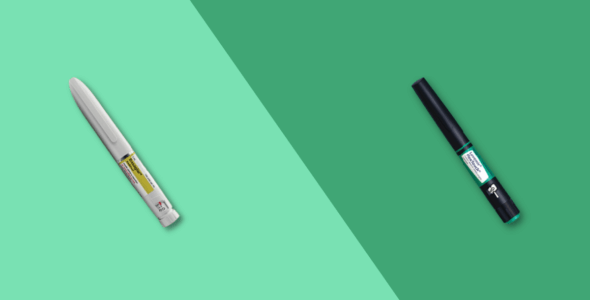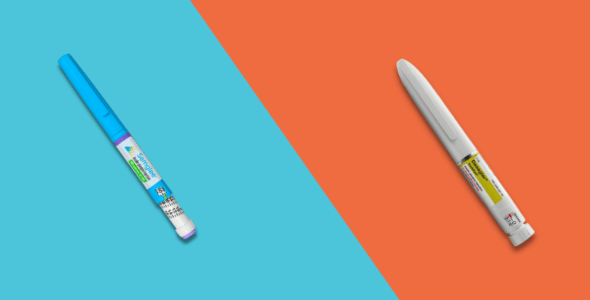Basaglar side effects and how to avoid them
Table of contents
Basaglar is a brand-name insulin product manufactured by Eli Lilly and Company. It is classified as a biological medication used to manage hyperglycemia (high blood sugar levels) in adults and pediatric patients aged 6 years and older. While Basaglar is generally well tolerated, there are some potential side effects that people should be aware of. The most common side effects of Basaglar include hypoglycemia and injection site reactions. Less common but more serious side effects can include life-threatening allergic reactions.
Learn more about the side effects of Basaglar and what you can do to avoid them.
What is Basaglar (insulin glargine)?
Basaglar KwikPen (insulin glargine) is an FDA (Food and Drug Administration)-approved long-acting type of insulin used with diet and exercise to improve glycemic control in adults and pediatric patients with type 1 diabetes mellitus and adults with type 2 diabetes mellitus.
How does Basaglar KwikPen work?
Basaglar KwikPen (insulin glargine) is a biological medication that works similarly to human insulin (endogenous) made by your body. The main action of insulin, including the long-acting insulin Basaglar KwikPen, is to control blood glucose levels. It does this by promoting the uptake of glucose into muscle and adipose tissue (fat) and preventing glucose production in your liver. Insulin also inhibits the breakdown of fat (lipolysis) and protein (proteolysis).
Basaglar dosage
Basaglar is available in injection form as Basaglar KwikPen and Basaglar Tempo PenTM. Toujeo contains 3 times as much insulin per mL than the Basaglar brand.
Basaglar is given as a subcutaneous injection under the skin once daily at the same time. Do not inject Basaglar into a vein or a muscle, and do not inject into the same place two times in a row.
You are advised to read the prescribing information provided with this medicine for the drug information and patient information, and always speak with your healthcare provider for medical advice about any changes to your dose so they can monitor and evaluate your condition.
Basaglar side effects
The most common possible side effects of Basaglar include:
- Hypoglycemia (low blood sugar) – shakiness, fast heartbeat, hunger, headaches, confusion, lightheadedness, numbness, or tingling of tongue, lips, or fingers
- Injection site reactions
- Skin rash
- Weight gain
- Edema
- Loss of fat tissue (lipodystrophy)
Basaglar KwikPen can sometimes cause serious side effects, including:
- Life-threatening hypersensitivity reactions, including hives, angioedema, and trouble breathing
- Hypokalemia (low potassium levels) – leg cramps, irregular heartbeats, increased thirst or urination, kidney problems, muscle weakness
If you experience any of these serious side effects, stop taking Basaglar and seek medical attention immediately. You are encouraged to report the negative side effects of prescription drugs to the FDA. Visit www.fda.gov/medwatch, or call 1-800-FDA-1088.
Does Basaglar make you gain weight?
Yes, Basaglar may cause weight gain as a side effect. Speak to your doctor for medical advice if you experience this side effect.
Does Basaglar make you tired?
Basaglar may cause symptoms of low blood sugar, including dizziness, sweating, and tiredness.
Does Basaglar cause diarrhea?
Yes. You may experience diarrhea as a side effect when using Basaglar. Speak to your healthcare provider for medical advice if you experience this side effect.
Basaglar drug interactions
When Basaglar KwikPen is taken with other drugs, they may change Basaglar’s glucose-lowering effect or increase the frequency and severity of side effects. Make sure your doctor is aware of all prescription drugs, over-the-counter medications, vitamins, and herbal supplements you take. Some major drug interactions with Basaglar KwikPen include:
- Other diabetic medications
- ACE inhibitors
- Sulfonamide antibiotics
- Atypical antipsychotics
- Estrogens, progesterones, and oral contraceptives
- Thyroid hormones
- Beta-blockers
- Diuretics
- Corticosteroids
- Monoamine oxidase inhibitors (MAOIs)
- Glucagen (glucagon)
Is 20 units of Basaglar a lot?
No, A child weighing about 44 pounds (lbs) will use 8 to 20 units each day. One-third of this would be long-acting insulin (Basaglar), meaning the dosage of Basaglar would be 2 to 7 units once daily. Doses are based on body weight and will naturally be higher for adults.
Basaglar contraindications
Basaglar KwikPen should not be taken if you have had an allergic reaction to its active ingredient, its excipients, or other insulin glargine products. It is also contraindicated in patients who are having episodes of hypoglycemia (low blood sugar level) or diabetic ketoacidosis. Also:
- Never share your Basaglar KwikPen, needles, or syringes
- The risk of hypoglycemia, including severe hypoglycemia, is increased with changes to your insulin dose, insulin regimen, diet, or physical activity. Make sure you are familiar with the symptoms of hypoglycemia, such as tremors, nervousness, increased heartbeat, sweating, confusion, fatigue, and hunger
- Severe allergic reactions have occurred with Basaglar KwikPen. Discontinue Basaglar KwikPen immediately and seek medical assistance if you have any signs of anaphylaxis
- Increased risk of fluid retention, edema, and heart failure when Basaglar KwikPen is used with thiazolidinediones (TZDs) such as Actos (pioglitazone)
- It is not known if Basaglar is safe to use during pregnancy or while breastfeeding
Basaglar vs Lantus side effects
Basaglar and Lantus both contain insulin glargine, a long-acting insulin used to help manage blood sugar levels in type 1 and type 2 diabetes. Both are given as once-daily injections under the skin. Basaglar is not considered to be biosimilar to Lantus due to different manufacturing processes, but the two drugs do have similar side effects.
How to avoid Basaglar side effects
The best way to avoid side effects is to take Basaglar as directed by your doctor. Follow your doctor’s instructions carefully, and do not take more or less than prescribed.
If you experience any side effects, talk to your doctor or pharmacist. They may be able to recommend ways to help reduce or prevent some of the side effects.
1. Stick to the recommended dosage
Take your prescribed dose of Basaglar recommended by your healthcare professional. Do not take more or less than prescribed.
2. Monitor your blood sugar levels
If you have diabetes, it is important to monitor your blood sugar levels closely while taking Basaglar. Check your blood sugar levels as directed by your doctor and report any changes to your doctor immediately.
3. Drink plenty of fluids
Drink eight to 10 glasses of water or fluids every day to help prevent dehydration, which can make side effects worse.
4. Avoid alcohol
Avoid drinking alcohol while taking Basaglar, as it can make managing your blood sugar levels more difficult, increasing the risk of hypoglycemia.
5. Don’t skip meals
Eating regular meals and snacks will help to prevent low blood sugar levels (hypoglycemia).
6. Check your feet
If you have diabetes, check your feet for any cuts, sores, or redness regularly. Tell your doctor if you experience any problems with your feet while taking Basaglar.
7. Know the signs and symptoms of Basaglar side effects
Signs and symptoms of side effects include hypoglycemia and injection site reactions. If you experience these symptoms, speak to your doctor for medical advice.
8. Monitor your weight
Basaglar may cause weight gain. If you experience this side effect while taking Basaglar, get medical advice from your doctor.
9. Tell your doctor about all medications you’re taking
Be sure to tell your doctor about all other medications you’re taking, including over-the-counter drugs, vitamins, and herbal supplements, as they can interact with Basaglar.
10. Get regular medical checkups
It is important to get regular medical checkups and monitor your medical conditions. Your doctor will monitor your side effects and may adjust your dose of Basaglar as needed.
Medically reviewed
A medical professional has reviewed this article.


Jamie Winn, PharmD
Jamie Winn, PharmD
Dr. Jamie Winn received his Doctor of Pharmacy in 2002 from the University of South Carolina College of Pharmacy, Columbia, SC. Jamie is a medical reviewer for NiceRx.




